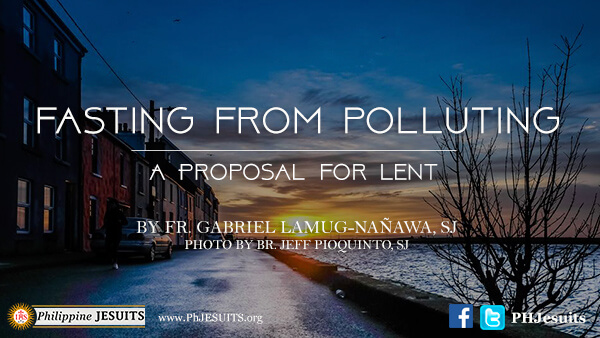


Fr. Gabriel Lamug-Nañawa, SJ
February 17, 2016
Pollution is when we put something into the environment, whether intentionally or not, that is harmful or poisonous to others. We are not really aware of the effects of pollution in the world and how we contribute to it. So perhaps it would be helpful to consider some facts–
Pollution does not kill us directly or quickly. Instead, pollution weakens our bodies and makes us vulnerable to many diseases such as diarrhea, chest infections, cancers, respiratory and heart diseases. And the people most likely to be affected first are the poor, due to their already limited access to clean water, clean food and clean air. The poor suffer first.
During this season of Lent, we are invited to enter our own deserts, to reflect on ourselves and on our sinfulness. We do this not by looking only at our own persons, as in a vacuum, but by examining our relations with others—other people, other creatures, our environment, with God. We are invited to assess our accountability for negatively affecting the environment and the people around us, especially the poisoned poor.
So how about fasting from polluting this Lent? Many of us will be fasting from food, soft drinks, chocolate, or things that make us gain weight. But as the world we share gets more and more degraded, and more of our brothers and sisters are getting sick, perhaps we can keep them in mind and fast from contributing to this situation.
These initial steps are not new at all, but perhaps actually doing them will be.
In our office in Cambodia, all members are strongly discouraged from using single-use plastic straws and disposable plastic water bottles. However, anyone who really has to use these things may do so, but he/she will have to pay a pollution tax for that action.
So as we enter our deserts this Lent, let us refrain from creating more poison and harm in the world. Rather, may our actions reflect a simpler, more humble and caring approach towards others and the rest of God’s good creation.
Care of the environment and reconciliation with creation are integral components of the Jesuit mission. Fr. Gabriel Lamug-Nañawa, SJ or Fr. Gabby is currently missioned to Cambodia and coordinates the Ecology Program of Jesuit Service-Cambodia. Be our mission partner by visiting the JesuitAid website.
PURITA R. MARTIN on February 21, 2018 AT 09 am
Thank you Father Gab for sharing your thought. The season of lent will give us more time to meditate on our responsibility to keep our environment more viable for healthful living.
Comments are closed.